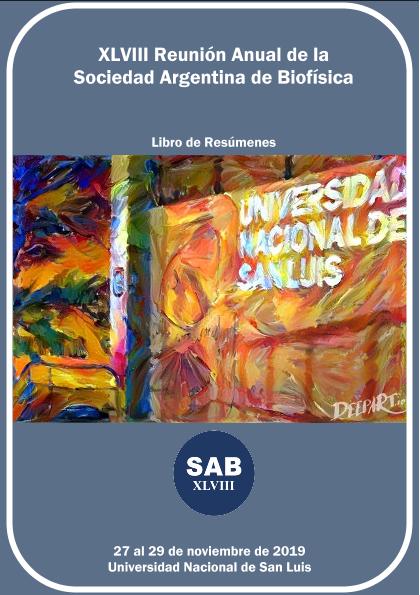Mostrar el registro sencillo del ítem
dc.contributor.author
Rodriguez, Carolina Mercedes

dc.contributor.author
Perillo, Maria Angelica

dc.contributor.author
Nolan, María Verónica

dc.contributor.other
Andujar, Sebastian Antonio

dc.date.available
2022-04-04T10:16:51Z
dc.date.issued
2019
dc.identifier.citation
Effect of PEG-induced molecular crowding on β-Gal thermal stability; XLVIII Reunión Anual de la Sociedad Argentina de Biofísica; San Luis; Argentina; 2019; 168-168
dc.identifier.isbn
978-987-27591-7-9
dc.identifier.uri
http://hdl.handle.net/11336/154220
dc.description.abstract
The yeast β-galactosidase or lactase [EC 3.2.1.23] (β-Gal) is a soluble enzyme capable of catalyzing lactose hydrolysis into its constitutive monosaccharides: glucose and galactose. This enzyme has a commercial application for lactose hydrolysis in dairy products. Milk processing with b-Gal before milk is commercialized is important to solve nutritional (lactose intolerance) and technological (crystallization of dairy products) problems. In this context, it is important that the activity of β-Gal be evaluated in crowding media systems. In this work we investigate the effect that molecular crowding induces on thermal stability of β-galactosidase from Kluyveromices lactis. PEG6000, a non-charged highly water-soluble polymer with well-known effects on water dynamics was used to produce the crowded environment. The effect of PEG on β-Gal thermal stability was studied with two different approaches. In the first one, β-Gal samples both in the absence or in the presence of PEG6000 were preincubated at different temperatures in a range from 37 to 75 °C. After that, the system was returned to optimal conditions and enzymatic activity was tested. Results obtained showed that β-Gal stability was enhanced in molecular crowded environment. The enzyme maintained its activity when it was pre-incubated at temperatures 5 degrees higher in the presence than in the absence of molecular crowding agent. In the second approach, the inactivation kinetic was studied: in this type of experiments, the enzyme was pre-incubated at 37 or at 50 °C during different periods of time and after that, the enzymatic activity was measured in optimal conditions. Results obtained show again that molecular crowding conditions protect the enzyme from heat denaturation. In this case, it was observed that the enzyme maintains its activity even when it is subjected for a considerable period of time at high temperature when it is in the presence of the molecular crowding agent. In both cases, the enzymatic reaction was evaluated by measuring kinetic parameters of β-Gal against an artificial substrate (ONPG). Changes in protein compactness could be the responsible for the qualitative change behavior observed at the molecular crowding conditions assayed.
dc.format
application/pdf
dc.language.iso
eng
dc.publisher
Sociedad Argentina de Biofísica
dc.rights
info:eu-repo/semantics/openAccess
dc.rights.uri
https://creativecommons.org/licenses/by-nc-sa/2.5/ar/
dc.subject
Beta-galactosidase
dc.subject
Molecular crowding
dc.subject
Enzymatic activity
dc.subject
Thermal stability
dc.subject.classification
Biofísica

dc.subject.classification
Ciencias Biológicas

dc.subject.classification
CIENCIAS NATURALES Y EXACTAS

dc.title
Effect of PEG-induced molecular crowding on β-Gal thermal stability
dc.type
info:eu-repo/semantics/publishedVersion
dc.type
info:eu-repo/semantics/conferenceObject
dc.type
info:ar-repo/semantics/documento de conferencia
dc.date.updated
2022-03-16T21:06:20Z
dc.journal.pagination
168-168
dc.journal.pais
Argentina

dc.journal.ciudad
Buenos Aires
dc.description.fil
Fil: Rodriguez, Carolina Mercedes. Consejo Nacional de Investigaciones Científicas y Técnicas. Centro Científico Tecnológico Conicet - Córdoba. Instituto de Investigaciones Biológicas y Tecnológicas. Universidad Nacional de Córdoba. Facultad de Ciencias Exactas, Físicas y Naturales. Instituto de Investigaciones Biológicas y Tecnológicas; Argentina
dc.description.fil
Fil: Perillo, Maria Angelica. Consejo Nacional de Investigaciones Científicas y Técnicas. Centro Científico Tecnológico Conicet - Córdoba. Instituto de Investigaciones Biológicas y Tecnológicas. Universidad Nacional de Córdoba. Facultad de Ciencias Exactas, Físicas y Naturales. Instituto de Investigaciones Biológicas y Tecnológicas; Argentina
dc.description.fil
Fil: Nolan, María Verónica. Consejo Nacional de Investigaciones Científicas y Técnicas. Centro Científico Tecnológico Conicet - Córdoba. Instituto de Investigaciones Biológicas y Tecnológicas. Universidad Nacional de Córdoba. Facultad de Ciencias Exactas, Físicas y Naturales. Instituto de Investigaciones Biológicas y Tecnológicas; Argentina
dc.relation.alternativeid
info:eu-repo/semantics/altIdentifier/url/https://biofisica.org.ar/publicaciones/libros-de-resumenes/
dc.conicet.rol
Autor

dc.conicet.rol
Autor

dc.conicet.rol
Autor

dc.coverage
Nacional
dc.type.subtype
Reunión
dc.description.nombreEvento
XLVIII Reunión Anual de la Sociedad Argentina de Biofísica
dc.date.evento
2019-11-27
dc.description.ciudadEvento
San Luis
dc.description.paisEvento
Argentina

dc.type.publicacion
Book
dc.description.institucionOrganizadora
Sociedad Argentina de Biofísica
dc.description.institucionOrganizadora
Universidad Nacional de San Luis
dc.source.libro
XLVIII Reunión Anual de la Sociedad Argentina de Biofísica: Libro de Resúmenes
dc.date.eventoHasta
2019-11-29
dc.type
Reunión
Archivos asociados
